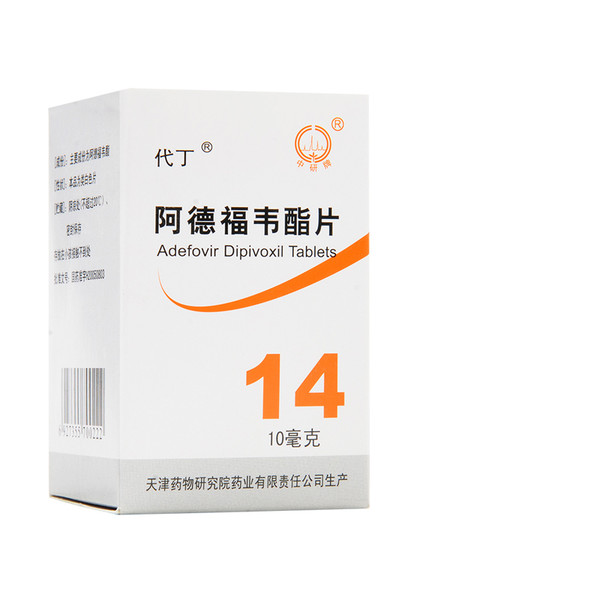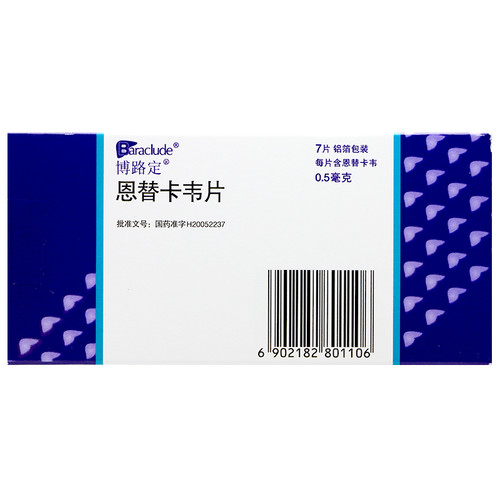Product Overview
Generic name: Adefovir dipivoxil tablets
Chinese Pinyin: Adefuweizhi Pian
English name: Adefovir Dipivoxil Tablets
Product name: Dai Ding
Ingredients: The main ingredient of this product is adefovir dipivoxil.
Properties: This product is a white-like film.
Indications: It is suitable for the treatment of adult patients with chronic hepatitis B with compensatory liver function who have symptoms of active replication of hepatitis B virus accompanied by continuous elevation of serum amino acid transferase (ALT or AST) or active liver histological lesions.
Specification: 10mg*14 tablets/bottle
Usage and dosage: Patients must use this product under the guidance of a doctor with experience in the treatment of chronic hepatitis B.
1. For adults (18-65 years old), the recommended dose of this product is once a day, 10 mg each time, orally before or after meals.
2. The best course of treatment has not yet been determined. Do not exceed the recommended dosage.
3. Patients should monitor hepatitis B biochemical indicators, virological indicators and serum markers regularly, at least once every 6 months.
Adverse reactions: weakness, headache, abdominal pain, nausea, (gastrointestinal) bloating, diarrhea and indigestion.
Contraindications: Adefovir dipivoxil is forbidden to be used in patients who have been allergic to any component of this product.
Note: 1. Acute exacerbation of hepatitis will occur when patients stop hepatitis B treatment, including stopping the use of adefovir dipivoxil. Therefore, patients who stop hepatitis B treatment should closely monitor liver function, and if necessary, anti-hepatitis B treatment should be restarted.
2. For patients with renal dysfunction or potential risk of renal dysfunction, chronic treatment with adefovir dipivoxil can cause nephrotoxicity. These patients should closely monitor renal function and adjust the dose appropriately.
3. Before treatment with adefovir dipivoxil, all patients should be tested for human immunodeficiency virus (HIV) antibodies. The use of anti-hepatitis B treatment drugs, such as adefovir dipivoxil, will have an effect on unknown or untreated HIV carried by chronic hepatitis B patients, and HIV resistance may appear.
4. Single use of nucleoside analogues or combined use of other antiretroviral drugs can cause lactic acidosis and severe liver enlargement with steatosis, including fatal events.
5. Because the risk to developing human embryos is still unclear, it is recommended that women of childbearing age treated with adefovir dipivoxil take effective contraceptive measures.
Drug interactions: 1. Adefovir dipivoxil is rapidly converted to adefovir in the body. At concentrations significantly higher than those observed in vivo (>4000 times), adefovir has no inhibitory effect on any of the following common human CYP450 enzymes: CYP1A2, CYP2C9, CYP2C19, CYP2D6 and CYP3A4. Adefovir is not a substrate for these enzymes. However, it is not clear whether adefovir induces CYP450 enzymes. 2. According to the results of in vitro experiments and the renal elimination pathway of adefovir, adefovir, as an inhibitor or substrate, is unlikely to interact with other drugs mediated by CYP450. Adefovir is excreted through the kidneys through glomerular filtration and active secretion by renal tubules. The combination of 10 mg adefovir dipivoxil with other drugs secreted by the renal tubules or drugs that change the secretion function of the renal tubules can increase the serum concentration of adefovir dipivoxil or the combined drugs. 10mg adefovir dipivoxil and 100mg lamivudine were used in combination, and the pharmacokinetic properties of the two drugs remained unchanged. Caution should be exercised when combining 10 mg adefovir dipivoxil with drugs that are actively secreted through the renal tubules, because two drugs compete for the same elimination pathway, which may cause the serum concentration of adefovir or the combined drug to increase.
Pharmacology and Toxicology: 1. Chronic toxicity: In animal experiments, renal tubular nephropathy characterized by histological changes and/or increased urea nitrogen and serum creatinine is the main dose-limiting toxicity of adefovir dipivoxil. The exposure to nephrotoxicity observed in animal experiments is about 3 to 10 times the recommended human therapeutic dose (10 mg/day). 2. Genotoxicity: In the in vitro mouse lymphoma test (with or without metabolic activation), adefovir dipivoxil has mutagenic effects. In the human peripheral blood lymphocyte test, adefovir dipivoxil can induce chromosomal aberrations when there is no metabolic activation. The result of adefovir dipivoxil mouse micronucleus test is negative, and the Ames test result of adefovir with or without metabolic activation is negative. 3. Reproductive toxicity: When the exposure is approximately 19 times the human exposure at the therapeutic dose, there is no effect on rat fertility. Rats and rabbits were orally administered adefovir dipivoxil (exposures were approximately 23 and 40 times the human therapeutic dose of 10 mg/day), and no embryo toxicity and teratogenic effects were seen. Adefovir was administered intravenously to pregnant rats. At a dose that can produce obvious maternal toxicity (equivalent to 38 times the human exposure), embryo toxicity and fetal malformations (generalized edema, sunken eye vesicles, umbilical hernia and kinked tail) The incidence of increased. No adverse effects were seen when the intravenous dose was 12 times the human exposure. 4. Carcinogenicity: When adefovir dipivoxil was orally administered to mice and rats at a dose equivalent to 10 times and 4 times the human exposure dose, there was no carcinogenic effect.
Pharmacokinetics: Patients with liver damage. Patients must be treated with this product under the guidance of a doctor with experience in the treatment of chronic hepatitis B. Adults (18-65 years old) For patients with normal renal function, the recommended dose of this product is 10 mg once a day, orally before or after meals. This indication is mainly based on the results of a 48-week clinical trial The best course of treatment has not been determined. Do not exceed the recommended dose. The relationship between therapeutic efficacy and long-term clinical prognosis (such as hepatocellular carcinoma or decompensated cirrhosis) has not been determined. Patients should regularly monitor the biochemical indicators of hepatitis B, Virological indicators and serum markers, at least once every 6 months. The following conditions can be considered to be discontinued. According to the treatment experience of lamivudine, HBeAg-positive patients will continue to be treated for 6 after HBeAg seroconversion occurs after treatment with this product Months, the test confirms that the curative effect is consolidated, and the treatment can be considered to be discontinued. For patients with HBeAg-negative, long-term treatment is recommended, at least to achieve HBsAg seroconversion or loss of curative effect. Discontinuation of the drug. The pros and cons must be weighed when discontinuing the drug. An experienced doctor should carefully monitor the patient Monitoring. For patients with decompensated liver disease or decompensated cirrhosis during treatment, it is not recommended to discontinue the drug. Adefovir is excreted by the kidney in patients with renal impairment, so patients with renal insufficiency need to adjust the dosing interval . Creatinine clearance rate & ge; patients with 50 mL/min do not need to adjust the dosing interval. Creatinine clearance rate. 1. The pharmacokinetics of adefovir dipivoxil in healthy volunteers and patients with chronic hepatitis B are similar. A single oral dose of adefovir The bioavailability of defovir dipivoxil is about 59%, and the maximum plasma concentration (Cmax) of adefovir after taking 0.58-4.00h (median=1.75h) is 18.4±; 6.26ng/mL. AUC0-∞ is 220±; 70.0ngh/mL. Plasma adefovir is eliminated in a two-compartment manner, and the terminal elimination half-life is 7.48±; 1.65h. Adefovir is in vitro with human plasma or serum protein in the concentration range of 0.1-25ug/mL Combined with ≤ 4%. The steady-state distribution volume of intravenous injection of 1.0 or 3.0mg/kg/day is 392±; 75 and 352±; 9mL/kg, respectively. After oral administration, adefovir dipivoxil is rapidly converted to Ade Fovir. Oral adefovir dipivoxil 10mg steady state 24h recovery of adefovir 45% from urine. 2. Healthy Chinese male subjects take a single oral dose of 10mg adefovir dipivoxil on an empty stomach, the study results were: AUC0- t is (224.75±; 69.67) ng.h/mL; AUC0-¥ is (251.01±; 75.43) ng.h/mL; Cmax is (21.24±; 7.87) ng/mL; Tmax is (1.97±; 0.99) h; T1/2 is (9.68± ;5.01)h.
Medication for pregnant women and lactating women: The effects of pregnant women and adefovir dipivoxil on mother-to-child transmission of HBV have not been studied. Therefore, infants should be immunized to prevent infants from being infected with hepatitis B virus; it is not yet known whether adefovir is It will be secreted into human breast milk. Women who are breastfeeding should avoid breastfeeding when using this product.
Pediatric medication: The efficacy and safety of adefovir dipivoxil in patients under 18 years of age are not yet clear. This product is not suitable for children and adolescents.
Medication for elderly patients: The efficacy and safety of adefovir dipivoxil in elderly patients over 65 years of age are not yet clear.
Overdose: Adefovir dipivoxil 500mg daily for two weeks and 250mg for twelve weeks can cause gastrointestinal side effects. If an overdose occurs, toxic reactions should be monitored and necessary treatment should be given. If an overdose occurs, the patient must be monitored for evidence of poisoning, and standard supportive therapy must be taken if necessary. Adefovir can be cleared by hemodialysis, and the median hemodialysis clearance rate of adefovir after weight correction is 104mL/min. No studies have been conducted on peritoneal dialysis to remove adefovir.
Storage: Store in a cool place (not exceeding 20 degrees Celsius), sealed. Keep out of reach of children
Packaging: Sealed in a medicinal high-density polyethylene plastic bottle with silica gel desiccant, 14 tablets/bottle.
Validity period: 23 months
Approval number: National Medicine Standard H20050803
Company Name: Tianjin Pharmaceutical Research Institute Pharmaceutical Co., Ltd.










